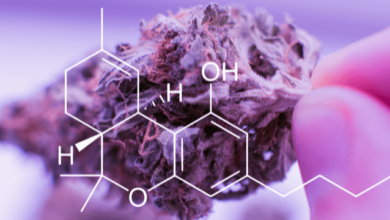
Table of Contents
How does CBD oil for fibromyalgia work?
For those of you unacquainted with fibromyalgia, it is a disorder that is characterised by musculoskeletal pain across the body. The symptoms are often accompanied by foggy memory, fatigue, drowsiness, mood swings, etc. As of now, the condition is not curable but certainly manageable. Research is still being conducted in this field, however, experts believe that the condition manages to amplify the sensation of pain as it alters how the parts of the brain which process pain interpret the signals.
When it comes to the question of CBD oil in managing fibromyalgia-related pain, the research is scant. But the pain is often so unmanageable and the options of treatment so few, people with fibromyalgia have happily turned to CBD oil in hope for some relief.
Having said that, while the research is minimal, CBD oil does have the potential for treating symptoms of pain. It is difficult to pinpoint what about the chemical compound can alleviate fibromyalgia symptoms, but there are some strong lines of research that are being explored at present.
It is known that CBD has an anti-inflammatory property that can reduce heat and swelling in the event of an injury. The same properties apply even in pain reduction. The jury is also still out on why these properties are effective in some people but not in others. Just how fibromyalgia affects how the brain processes pain signals, the CBD components perhaps have the same effect of tricking or altering the brain’s behavioural patterns. It is believed that CBD may have a hand in interrupting the nerve pathways that transmit signals between the brain and the body.
In this debate about why CBD oil seems to be effective in some cases and not in others, there is also a question of whether it might be more effective if it is used as medical marijuana or if it used alone. There is evidence to suggest that the positive components of CBD may be enhanced when it is mixed with other chemicals.
For example, a study conducted in 2006 found that a combination of THC and CBD may actually work better together to alleviate pain symptoms. There has, however, not been too much research on this since.
Cannabidiol treatment options
There are a few different ways in which CBD can be administered:
Smoking or vaping
There are vape pens available that allow you to vape or smoke CBD oil. This is an effective way of administering CBD oil as it enters your lungs directly and, therefore, reaches your bloodstream much faster.
Topicals
Topicals are essentially ointments or oils. These are especially useful for pain relief as the CBD oil can be applied directly on the area that is hurting. The effects of the oil or topical are then localised and it has a more targeted impact instead of spreading all over your body.
Edibles
Any food item that has been infused with CBD is an edible. This is one of the easiest ways of administering CBD. CBD best selling edibles are available in the form of gummies, chocolates, beverages like coffee, etc.
Are there side effects to taking CBD oil for fibromyalgia ?
As has been amply mentioned above, the research into whether CBD oil is a safe and effective treatment for fibromyalgia is still being carried out. However, some of the side effects that have been reported are:
- Dry mouth
- Low blood pressure
- Drowsiness
- Lightheadedness
- Changes to liver enzymes
With CBD alone, there does not seem to be a problem of addiction. Its toxicity level is also relatively low so it would require a very high dosage for someone to overdose.
Is treating fibromyalgia with CBD legal?
Now, this is the most important question. There is no point discussing the benefits of CBD oil if it is not legal in the area you live in! While usually, the answer of legality is in terms of ‘yes’ or ‘no’.
But in the case of CBD oil, the rules are different depending on where you are situated. For example, in the United States, while manufacturers and hemp growers claim that their product is legal as long as it has less than 0.3% THC, however, this is not a claim that is bought in all 50 states. In states where marijuana has been legalised, the course ahead is quite simple for those who want to try CBD oil. But the rules are different in each state.
In the UK, however, the rules are slightly more straightforward. As of now, cannabis is a controlled drug which has been classified as such by the Misuse of Drugs Act of 1971. While almost all the cannabinoids of cannabis are controlled under this act, cannabidiol or CBD is not. This means that CBD oil can easily be purchased in the UK as long as the THC content in the oil is less than 0.2% and the THC cannot be easily extracted.
Dosage guidelines for fibromyalgia
The thing to know about CBD oil and its dosage is that everyone has a different threshold. What may work for a female teenager may not work for an elderly male. There is no recommended daily allowance (RDA) for CBD oil so it is difficult for doctors to prescribe a specific amount. The dosage also differs from ailment to ailment and depending on the kind of use you are hoping to get out of the CBD oil. So the dosage for cancer will be different from the dosage for fibromyalgia.
CBD, formally known as cannabidiol, is a naturally occurring chemical compound found in the cannabis plant. The chemical compounds of the cannabis plant genus are called cannabinoids and there are over 100 cannabinoids that occur in the plant. Each of the compounds has unique characteristics and several have been recognised for their health and recreational benefits. Another cannabinoid you may have heard of is THC or tetrahydrocannabinol. This is the psychoactive compound found in cannabis and while CBD and THC have similar benefits, the latter is psychoactive and causes a feeling of being “high”.
CBD oil, as it may have become apparent from the description above, is the oil that contains this chemical compound. The compound is typically extracted from industrial hemp plants (which makes it easier to market the oil as an over the counter supplement). It is primarily extracted from the stalks and stems of the hemp plant. Once the extract has been derived, it is diffused with a carrier oil, like coconut, olive or hemp oil.
Alternatives for fibromyalgia treatment
There are a number of ways that you can relieve the symptoms of fibromyalgia without resorting to CBD or mainstream pharmaceuticals. Naturally, using these is a matter of trial and error and you may find some more effective than others. You might find that some are not effective at all.
Getting enough sleep
Yes it can be difficult to get sleep when you’re in pain but making sure you get at least eight hours a night is essential in the fight against fibromyalgia. If your body is well-rested it is then able to combat the symptoms of fibromyalgia effectively.
Not able to get a good night’s sleep at the best of times?
Try these tips and see if they can work for you.
- Don’t nap so much during the day – making sure you’re tired enough to go to sleep at night is key. This might lead you to feel exhausted or sleepy during the afternoons or evenings but stick with it and your body will adapt.
- Regulate your sleeping times – sticking to a regular pattern of sleep is the best way to make sure your body knows when it’s time to rest. If you find that your schedule fluctuates then keep a regular waking time. Even if it means you get only a few hours sleep some nights get up at your set time. You’ll be surprised how much more restful your sleep becomes.
- Avoid blue light or download a blue filter for your computer – this is a pretty easy fix. We all spend a lot of our days staring at computer screens, phone screens, and tablets. Try reducing that time as much as possible.
- Cut down on caffeine and alcohol – even if you don’t think you drink too much of either you might be more sensitive than you think. One of my friends has to stop drinking coffee by noon or his sleeping schedule goes completely off the loop.
Acupuncture
You’ve likely already heard of it before but in case you haven’t, acupuncture is a traditional Chinese form of medicine. It involves inserting extremely thin needles into the body to relieve symptoms of pain. It sounds painful but people who’ve had it done find it very enjoyable if a little prickly. Despite being an ancient science, there is still prevalent use today of acupuncture to deal with stress and for general wellness.
If you’re considering it, take the word of at least one study who said that “there is low to moderate‐level evidence that compared with no treatment and standard therapy, acupuncture improves pain and stiffness in people with fibromyalgia.”
Exercise
You knew we were going to say it, but it’s true. Exercising can actually be helpful for those with symptoms of fibromyalgia. We know it’s not easy, especially for those in extreme cases, but over time the muscle strength will build and your discomfort will ease.
Before you begin any exercise regime or dive into training for a triathlon you need to speak to a doctor. A registered physiotherapist can also give you the guidance you need to start your exercise schedule. This way you can avoid any further injuries or exacerbation of your symptoms.
There have been studies though that show that exercise can have a potentially positive influence on those suffering from fibromyalgia.
Medical cannabis for fibromyalgia
This is a last resort for many people but using cannabis for fibromyalgia can reduce symptoms of pain and stress. Since 2018 it has been legal for doctors to prescribe medical cannabis. However, many doctors are reluctant to prescribe medical cannabis for fibromyalgia due to its lack of research or widespread acceptance. That said, anecdotally speaking, many people believe that cannabis helped them reclaim their lives in the face of the difficulties of fibromyalgia.
Key takeaways for fibromyalgia
CBD oil has been known to have positive effects in cases of fibromyalgia. In some cases, the administering of CBD oil has helped with reducing the symptoms of pain and inflammation. However, as it has been mentioned above, the research in this area is still scant and there is a lot of room for exploration. Few guaranteed methods can ensure the symptoms of fibromyalgia can be managed.
But if there are other alternatives to the limited few methods that have been discovered, there is no harm in trying it. Certainly, there are a few side effects that have been reported but that could be as much a reaction to the carrier oil as it could be to the actual CBD component. The quality of production makes a huge difference in how a person may react to CBD oil. So while the jury is still out on whether CBD oil can be a safe and effective treatment for fibromyalgia, it certainly does not make a bad situation worse.






